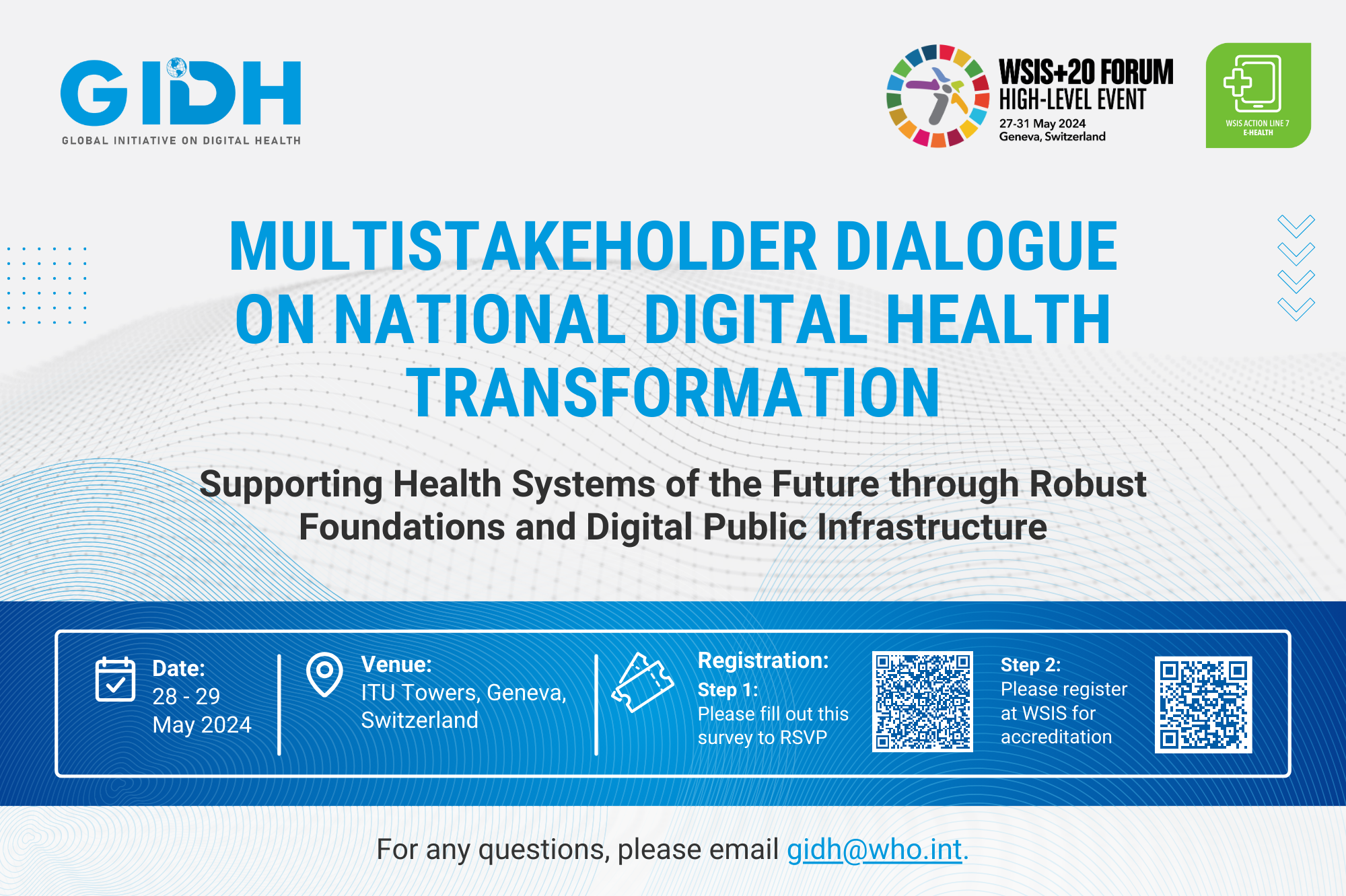Multistakeholder Dialogue on National Digital Health Transformation, 28-29 May 2024
World Health Organization and International Telecommunication Union
Session 384
Supporting Health Systems of the Future through Robust Foundations and Digital
Global support for national digital health transformation
The Global Strategy on Digital Health 2020-2025 (GSDH) endorsed by 194 WHO Member States provides guidance and coordination on global digital health transformation and aims to strengthen synergies between initiatives and stakeholders through four strategic objectives focused on global collaboration, implementation of national digital health strategies, governance for digital health and people-centered health systems.
The GSDH, reached its mid-term in 2023 and while progress has been made with over 120 WHO Member States having a digital health strategy, there are many countries that do not yet have a digital health strategy, or for where the strategy has not been costed. Strengthened collaboration and amplification of resources is needed to support countries to develop costed digital health strategies among many other actions outlined in GSDH by 2025.
To support with this, the Global Initiative on Digital Health (GIDH) as a WHO Managed Network (“Network of Networks”) formally kicked off on 20 February 2024 promotes equitable access to digital health by addressing challenges such as duplication of efforts and limited investments into digital public infrastructure, governance, and capacity for in all aspects of the digital transformation of the health sector fully aligned with the e-government initiatives.
Under the WSIS Action line C7: E-Health, GIDH will convene global, regional and national stakeholders to deliberate on key digital health priorities and thematic topics and to share their experiences and lessons learned with standards based and country-led development of digital health architecture during the WSIS+20 High level event.
Objectives:
1. To inform the framework for a WHO-ITU Digital Public Infrastructure-based Reference Architecture for National Digital Health Transformation.
2. To discuss and identify key priority areas for multistakeholder dialogue on the global and national level for digital health transformation.
3. Present updates on the GIDH Transformation Toolbox.
4. High-level discussion on Digital Public Infrastructure and its role in the health sector.
Tentative agenda:
Wednesday 29 May
- 8:30 – 8:40: Welcome and Recap Day 1
- 8:40 – 9:00: Keynote on the role of Inclusion, Gender and Connectivity in equitable Digital Health Transformation
- 9:00 – 10:30: WORKSTREAM 5: Data and Digital Governance for Health (through Standards, Solutions and Structures)
- 10:30 – 11:00: Tea break
- 11:00 – 11:30: WORKSTREAM 6a: Global Digital Health Partnership (GDHP) with the Global Initiative on Digital Health (GIDH)
- 11:30 – 13:00: WORKSTREAM 6b: GDHP & GIDH: Member State Updates and Case Studies
- 12:00 – 13:00: Lunch
- 13:00 – 14:30: WORKSTREAM 7: Regional Updates and Case Studies
- 14:30-15:15: Africa CDC-WHO Digital Health Maturity and Data Collection (TBC)
- 15:15 – 16:15: Transformative Partnerships for Resilient Digital Health: Defining Ways Forward (organized by Digital Connected Care Coalition, DCCC) – TBC (With Working Tea & Coffee Break)
- 16:15 – 16:45: Measuring progress on the Global Strategy on Digital Health
- 16:45 – 17:00: Closing and Next Steps
-
 C1. The role of governments and all stakeholders in the promotion of ICTs for development
C1. The role of governments and all stakeholders in the promotion of ICTs for development
-
 C3. Access to information and knowledge
C3. Access to information and knowledge
-
 C4. Capacity building
C4. Capacity building
-
 C7. ICT applications: benefits in all aspects of life — E-government
C7. ICT applications: benefits in all aspects of life — E-government
-
 C7. ICT applications: benefits in all aspects of life — E-health
C7. ICT applications: benefits in all aspects of life — E-health
-
 C11. International and regional cooperation
C11. International and regional cooperation
Under the WSIS Action line C7: E-Health, GIDH will convene global, regional and national stakeholders to deliberate on key priorities and thematic topics and to share their experiences and lessons learned with standards based and country-led development of digital health architecture. Speakers will include digital health as well as e-government, development cooperation, financing, capacity building and ICT experts.
-
 Goal 1: End poverty in all its forms everywhere
Goal 1: End poverty in all its forms everywhere
-
 Goal 3: Ensure healthy lives and promote well-being for all
Goal 3: Ensure healthy lives and promote well-being for all
-
 Goal 4: Ensure inclusive and equitable quality education and promote lifelong learning opportunities for all
Goal 4: Ensure inclusive and equitable quality education and promote lifelong learning opportunities for all
-
 Goal 5: Achieve gender equality and empower all women and girls
Goal 5: Achieve gender equality and empower all women and girls
-
 Goal 10: Reduce inequality within and among countries
Goal 10: Reduce inequality within and among countries
-
 Goal 17: Revitalize the global partnership for sustainable development
Goal 17: Revitalize the global partnership for sustainable development
Please let the organizers know if you plan to attend this session by filling out the RSVP Survey.
